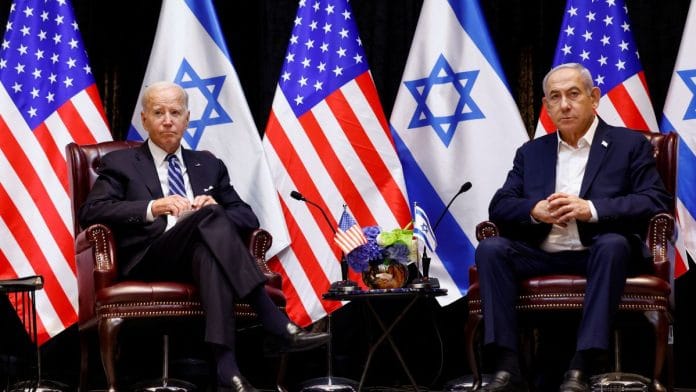The Speaker pro tempore of the US House of Representatives, Mike Johnson, has categorically placed America above any international law by saying, “We (US) don’t put any international body among or above American sovereignty.” Johnson, a law graduate who surely studied international law and the need for democracies to abide by it, has been a member of the Louisiana House of Republican Party since 2019. He made this assertion as the Speaker of the House.
The trigger for his antipathy was the International Criminal Court’s (ICC) arrest warrant against Israeli Prime Minister Benjamin Netanyahu, defense minister Yoav Gallant and Hamas leaders, including Yahya Sinwar, for the ongoing conflict in Gaza, which has resulted in the death of civilians. Israel launched a military campaign in Gaza in retaliation for the Hamas attack on 7 October 2023, killing about 1,200 civilians and taking 252 hostages. The retaliatory attacks have claimed more than 35,456 lives, as claimed by Hamas.
The US does not have a treaty with the ICC and it will probably never have one unless the constitution of America is amended or it accepts the supremacy of the ICC, which would violate its constitution. The Treaty Clause of the United States Constitution (Article II, Section 2, Clause 2) establishes the procedure for ratifying international agreements, empowering the President of the US as the primary negotiator of agreements with other countries. The clause also states that the advice and consent of a two-thirds supermajority of the Senate renders a treaty binding with the force of federal law.
US fights ICC
The ICC was formally constituted in 2002 after years of negotiations to establish a permanent international tribunal to prosecute individuals accused of genocide and other serious international crimes, such as crimes against humanity, war crimes, and crimes of aggression. The ground rules were laid by the United Nations General Assembly (UNGA), which convened a five-week diplomatic conference in Rome in June 1998. It led to the Rome Statute being adopted in July 1998 by a 120 to seven vote, with Iraq, Israel, Libya, China, Qatar, Yemen, and the US voting against the treaty.
Later, former US President Bill Clinton signed the Rome Statute in 2000 without creating any binding legal obligation to submit for trial by the ICC. However, after the Rome Statute reached the requisite 60 ratifications in 2002, the next President George W. Bush’s administration sent a note to the UN Secretary-General on 6 May 2002, informing that the US no longer intended to ratify the Rome Statute. And that it did not recognise any obligation toward it or the ICC.
Possible reason for this withdrawal could be that the US constitution permits the creation of only one Supreme Court. However, the 124-member Hague-based ICC is an international institution not created by the U.S.
The US’ refusal to participate in ICC citing sovereignty does not hold water as it has on earlier occasions participated in various international courts, including the International Military Tribunal for the Far East, the Nuremberg trials, and the International Criminal Tribunals for the former Yugoslavia and Rwanda. The US even justified ICC’s arrest warrant against Russia’s Vladimir Putin in 2023, accusing him of committing war crimes. Compelled to choose between Israel and the ICC, if the EU decides to stand with the latter, it will be an embarrassing situation for the US. France has already shown its support to the ICC.
Also read: A swayamsevak Narendra Modi as PM—what complain could RSS have with BJP in power?
Not a superpower behaviour
The US objection to ICC pronouncements against Israel is understandable. It sounds more like a condemnation of the military action against a terrorist outfit like Hamas, which was inevitable in the face of extreme provocation and the brutal October 2023 attack. The ICC equating a legitimate state with a terrorist outfit is totally illogical and unacceptable, to say the least. The international court has no authority to enforce its rulings nor any mandate to order a ceasefire. It is only the United Nations that can intervene in this conflict but its woeful lethargy and inaction is evident. The ICC, therefore, appears to have crossed its limits—it has entered the conflict more on the side of the terrorists rather than as an independent jury.
While many of the objections raised by the US against the ICC may be legally valid in these circumstances, its statements such as “If the ICC is allowed to threaten Israel’s leaders, we know that America will be next,” and “Congress is reviewing all options right now against the International Criminal Court,” and “We have some very aggressive legislation that we’re going to push,” are not in line with the behaviour expected of a responsible superpower. At a time when there are serious challenges to its status as an unquestioned world leader, and an economic superpower, its responsibility to respect international institutions and set an example for others is even greater.
Never in the last seven decades has the world order been challenged and sought to be usurped by autocratic hegemons as it is being witnessed now. The world has moved from unipolarity and bipolarity to multipolarity, necessitating a collective cooperative framework and a pooled leadership structure by economically strong countries with strict adherence to democratic values.
Instead of picking up a fight with the ICC, it would be better for the US to join hands with India and other democratic countries and form a larger multipolar coalition. This coalition could better navigate the world through the present crisis and conflicts.
Seshadri Chari is the former editor of ‘Organiser’. He tweets @seshadrichari. Views are personal.
(Edited by Ratan Priya)






